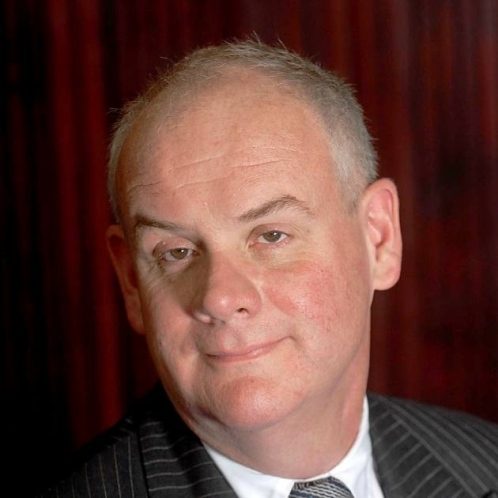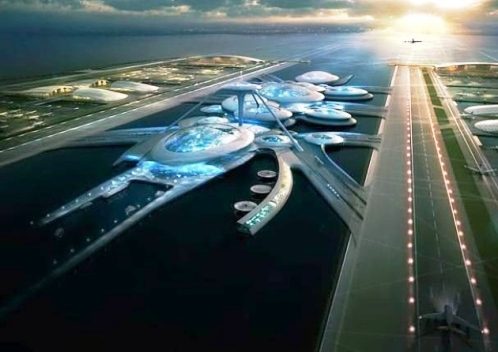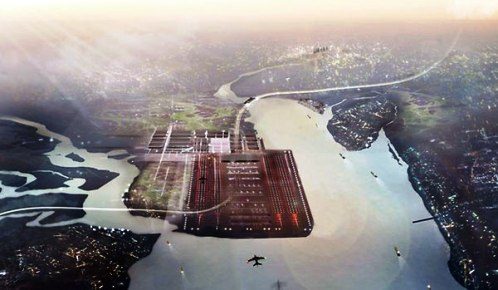It emerged at last week’s ‘Invest and Manage Airports’ conference at Stamford Bridge, the home of Chelsea Football Club, that Stansted Airport is becoming a popular new option to support London’s future air capacity concerns. In a lively keynote address to a packed room of industry executives, consultants and media, Daniel Moylan, adviser to Mayor of London, Boris Johnson, argued that alongside the construction of a new £50 billion hub airport to be built in east London in the next 15-20 years, Stansted was a real option to answering London’s air capacity issues. In his 30 minute address, Moylan also called for the UK government to bring forward its decision on airport expansion to next year, ahead of the next General Election.
Speaking at the ‘Invest and Manage Airports’ conference on October 19, 2012, Moylan said the issue of a new hub airport in London was an urgency that had to be dealt with sooner rather than later and lambasted the UK’s failure to develop a proper aviation policy over the last 50 years which has in fact consisted of a series of “accidental decisions”.

Moylan said that it was time for the UK to have a “consistent airport policy” which understood the need for a “well functioning hub airport”. He said that Heathrow in its current state “does not have all the characteristics of a hub airport and therefore cannot be the country’s hub of the future”. Instead he said the country should look to its neighbours, such as Amsterdam Schiphol, Paris Charles de Gaulle, and Frankfurt airports for examples of successful hubs. "Our European rivals have seen the benefits of having a hub airport and the benefits it brings to a city," he said.
The Mayor’s adviser said that to remain a ‘world city’ London needs to remain well connected through aviation, citing a “super connected highway of world cities that spans the globe”. He said: “London needs to remain part of that highway. Britain needs foreign investment and will lose it if it doesn’t remain part of that highway.”
In the case of Heathrow, London’s current largest international gateway, Moylan said it could never work as the UK’s future hub. “The site is far too constrained and only has two runways. But, the question is not where we can put the third runway, but more the fourth or the fifth. The airport has practically reached the limit of its growth,” he said.
According to Moylan, over the last 50 years the UK government has made “no decisions at all” but instead “kept its head in the sand”. Now, he said, “we must look to our Dutch, French and German neighbours and learn lessons from them”.
As for building a brand new hub airport in the Thames Estuary, dubbed by the media as ‘Boris Island’, Moylan said first of all the need for a new airport had to be accepted and then discussions on location would be held. That said, Moylan claimed east London would be an “ideal place” to put the new infrastructure. “The east of London is known for a degree of deprivation, joblessness, and low life expectancy. The economic benefits that a new airport in the area would bring, would be transformative. However the key is to get an agreement on a new airport first, and worry about the location later,” he said.
Ruling out Gatwick as a potential hub due to it physically being on the wrong side of London to connect to northern rail links, Stansted was highlighted by Moylan as “something Boris would consider”. He said the airport has space to grow and high-speed railway developments could make Stansted a “more attractive option” for London in the future. However, he raised concerns over the ability to effectively to Canary Wharf and the Docklands business community.
“Stansted as it is today is not a solution. Airlines don’t want to use it. In fact nobody wants to fly there and to get anybody too it has to be cheap, cheap, cheap,” Moylan explained in an exclusive interview with The HUB following his keynote address. “But, as a location of a four runway hub, although it may not be quite as attractive as an Estuary airport for its regenerative potential, it does have some logic too it.”

Moylan stressed the urgency of getting answers from the project and called for the new Aviation Commission to bring forward its recommendations on capacity expansion from 2015 to 2013. A parliamentary statement is due in the next week or so, which will establish and confirm full details of the Davies Commission and Moylan is pushing for its findings to be reported before the end of next year rather than the envisaged 2015 date set by the Government.
He said that the lack of urgency on a decision on airport capacity in the UK is "not related to the urgency of case or workload" but due to the fact that the recommendations are conveniently due to happen after the next general election. However, he said this is “not a political issue” and nothing to do with “losing votes or seats “as this would show “a level of foresight” from the Government. “Simply this is down to the Coalition and the fact that at the moment there are two parties who don’t agree on an aviation policy.”
It is essential we move forward as quickly as possible, according to Moylan as the Dutch, French and Germans are “leeching business away from us” and there is a “danger London will be at the end of a branch” rather than part of a ‘super highway’. “They have already done this with our shipping business, and could now do the same with aviation,” he added.
If we build a new Thames Estuary gateway or develop Stansted as London’s ‘new’ hub airport, what future is there for Heathrow? Well, according to Moylan, “Boris doesn't want to see Heathrow Airport close” and there is a case that London could support two hubs, said he was not "overly swayed" on this and that Heathrow could instead remain operational as a single runway facility supporting premium and leisure traffic to the west London, although this wasn’t necessarily a view that was well supported by the audience.
There was even a knock from Moylan into the plans from Birmingham Airport to become the short-term answer to London’s capacity constraints. “I keep hearing Birmingham Airport’s boss Paul Kehoe telling us he has space for ten million additional passengers. I have no problem with Birmingham Airport’s strategy, but do ten million people actually want to go there,” he said.
Moylan shows a strong passion for the aviation debate, something he says his boss shares. Formerly, deputy chairman of Transport for London, the statutory corporation established in 2000 that manages London’s Tube, buses and major roads, Moylan first began advising the Mayor on aviation following the last General Election in 2010. He took on a new role as chairman of the London Legacy Development Corporation – responsible for the development of the Olympic Park and its facilities after the London 2012 Games – in June 2012 but last month stepped down from that role to concentrate full time on aviation.
“I have worked with Boris for two years now to bring London’s pressing need for a new hub airport to the top of the political agenda. The 2012 Games have shown that Britain can deliver major projects better than anyone if it has the will to do so. A new hub airport to the east of London would be the greatest legacy we could create for London and the country at large. That is why I have accepted the Mayor’s invitation to put the majority of my time into aviation. The time for action is now and we need to bring the Government round to that view,” he said.

Speaking exclusively to The HUB following his ‘Invest and Manage Airports’ address, Moylan revealed more about how serious his boss, Boris Johnson, is about this matter. “Boris is completely passionate and tied-up in all of this,” he said. “In his role one hundred and one things pass his desk and 95 per cent of this is routine work, but half a dozen things, education’s one of them and aviation is another, where he is passionately engaged in trying to achieve something. We talk, text or speak to each other every day, including weekends.”
Moylan is forthright in his views and on behalf of the Mayor of London is really pushing for decisions to be taken in the air capacity debate. We find ourselves in this position due to the lack of clarity and conviction in the decision making abilities of past Government ministers and he urged the Coalition to stand up and make a decision. When questioned if we are 20 years too late with this decision making, he replied: “We are always too late in this country but it doesn’t mean we can’t catch up.”
As Moylan highlighted in his humorous opening to his ‘Invest and Manage Airports’ address, the Mayor of London and his constitute Londoners can at least take a little light from the slow decision making process; for as long as the Government debates the subject visitors to the UK capital can continue to enjoy “long periods flying circles over London” and getting to see “a wonderful view of the wonders of the city” as they wait for space to land.
(additional reporting by Dominic Welling, Editor – Airport Cities)





